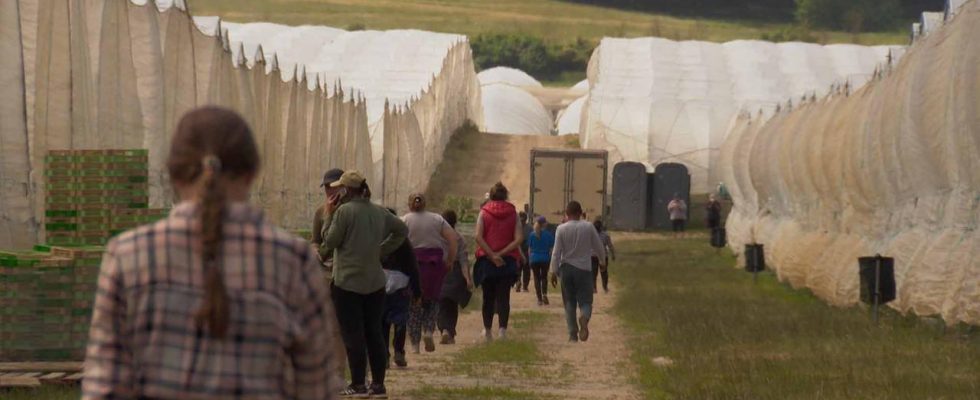europe magazine
Around 10,000 harvest workers are missing in Great Britain. But the British government does not want to help farmers with visas for workers from abroad. That would contradict their Brexit promises.
Tim Chambers is a nuisance to the British government. He is a large farmer in the south of England, manages 20 farms with currently around 1700 seasonal workers. Almost all of his harvest workers come from abroad: from Bulgaria, Kazakhstan and Indonesia.
The British government, peppered with Brexit believers, doesn’t want that. She doesn’t want cheap migrant workers, at most a minimum. The Brexit advocates had promised something else: These were jobs that British workers should do. Too much better wages.
Number of work visas capped
He’s been trying to attract locals for ten years – but says Chambers it’s impossible. The English didn’t want seasonal work. And neither does the work on the farm. Chambers is tending to the strawberry harvest right now.
He checks the quality of the fruit he has picked when he is not on the phone. Because he needs more harvest helpers and is desperately trying to get more. But the British government isn’t going along with it, which is a big annoyance for him.
The Ministry of the Interior issues 45,000 work visas. The number is capped. The duration too, for a maximum of six months. According to the industry, however, it needs 55,000, so 10,000 are missing.
A total of around 10,000 harvest workers are missing in Great Britain. It is often impossible to win over locals.
Brits should train themselves
“The Ministry of the Interior only approved the work visas when the season had actually started. Much too late,” criticizes Chambers. They had no planning security because it had been unclear for a long time to what extent there would be visas for harvest workers.
It sounds a bit like harassment, and it is. Interior Secretary Suella Braverman recently spoke at a meeting of ultra-conservatives from her party. There is absolutely no good reason why the UK would not train lorry drivers, butchers or harvest workers itself.
These are all jobs that have hitherto been largely taken over by workers from abroad and the absence of which is now causing major problems in the relevant industries. According to Braverman, Brexit is now enabling the British to build an economy in which mostly high wages are paid and which is less dependent on cheap foreign workers.
“Squeeze the low-wage sector”
That’s ridiculous, Farmer Chambers comments on the statements. “If the supermarkets pay me more money, I’ll be happy to hire £100,000 a year pickers too.” But supermarkets are far away from that. Actually, Secretary of the Interior Braverman knows that too. And yet it does not help farmers to find staff and additional visas. Wondering why?
For economists like Jonathan Portes from London’s King’s College, the question is easy to answer: From the perspective of Brexiteers, the labor shortage is not a problem at all. They even wanted that. “Their policy is to squeeze the sector that relies on low-wage workers. So that they are forced to invest in education. Or in technology,” Portes said.
“Economy like in dreamland”
To understand what the Brexit-driven government is up to, one has to look at its vision of the economy. Your former frontman, ex-Prime Minister Boris Johnson, has mentioned it again and again.
On the one hand, the number of migrants is to be significantly reduced, especially that of cheap labour. “They just push wages down,” said Johnson, for example, in an interview in January 2020. On the other hand, the Brexiteers want a new economy, like in a dream country. “Our vision is an economy with top salaries, low taxes, a highly educated workforce. With high productivity and rapidly increasing wages for low earners,” Johnson said in 2019.
His successor as Prime Minister, Rishi Sunak, a Brexiteer who is no longer Johnson’s friend but is still a brother in spirit, has been bombarding the nation for weeks with a slogan: “High wages, top-skilled economy.” Great Britain wants to train top people and bring the brightest into the country. “We want these migrants,” propagates Sunak.
In many places, robots are used as harvest helpers. The British government supports this trend.
Farmers should invest in technology
What does that actually mean for the strawberry harvest? So either that well-paid Britons take over – or robots. Unlike granting work visas to low-wage workers, the UK government is being generous in developing technology for agriculture. It gives the equivalent of 230 million euros to advance innovations. Prototypes are already in use, but not yet ready for the market. If these were run by well-paid engineers, the Strawberry Field dream of the Brexiteers would be a reality.
But it’s not that far yet. And certainly not in all areas where cheap labor determines everyday life. Economists are not only skeptical about the utopia of an economy in which the masses are well educated and earn well. Also, whether farmers can be forced to do without helpers from abroad and invest in robots. King’s College’s Jonathan Portes doubts both.
Farmer Chambers points out that the British government’s strategy is nonsense. She cannot squeeze the industry and at the same time demand that she spend more money on higher wages and robots.
The lack of harvest helpers will remain. Most recently, the government only reacted when consumers were also affected and were faced with empty fruit and vegetable shelves. But it’s not that far yet.
You can see this and other reports in Europamagazin – on Sunday at 12.45 p.m. in the first.

